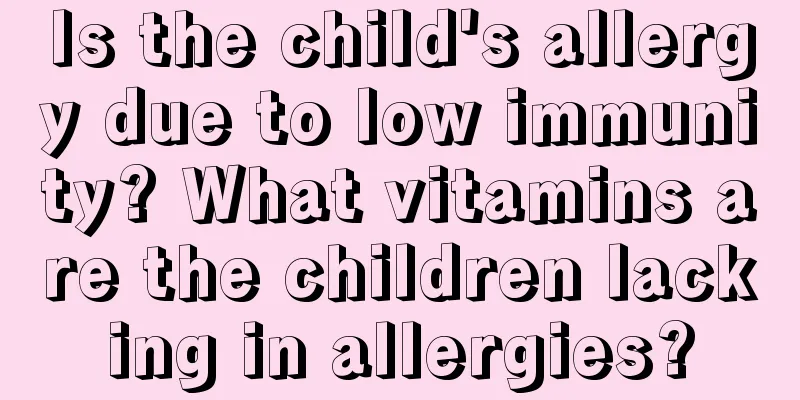What is the reason for the baby's green stool after eating rice cereal? Is it a big deal if the baby has green stool after eating rice cereal?

|
When babies start eating complementary foods, their bowel movements will be somewhat different from those of babies who are fed with breast milk. What exactly affects the baby's bowel movements? Here is a detailed introduction to what situations usually cause abnormal baby bowel movements, and how to deal with abnormal bowel movements. Baby eats rice cereal and has green stoolThis is because a certain amount of iron is added to most baby rice cereals. These irons fail to be fully absorbed in time after passing through the digestive tract and are excreted from the stool. After coming into contact with the air, they turn dark green. This may be the most common reason why babies have green stools after eating rice cereal. Normally, green stools are normal for babies with good appetite and spirits and no other discomfort symptoms. It is not scientific to say that babies have green stools because they are scared. It is generally normal for babies to have green stools. If the baby has bright green stools and is fussy, irritable, uncomfortable, or has diarrhea, it may be a viral infection. Breastfed babies will have bright green stools when they consume more foremilk than hindmilk. Mothers do not need to worry too much. Dark green or blackish green stools may be the product of iron supplements in the baby's diet, such as iron-fortified milk powder. Parents do not need to worry about this color change, which has no effect on the baby's digestive system. Abnormal stool in babyIf the baby's stool color is abnormal, the mother should first check whether the color of the complementary food is similar to the stool color. If the baby has eaten vegetable juice or vegetable puree that day, it is normal for the stool to be green. But if not, it may be caused by digestive problems, so you need to be vigilant. If the baby's stool is dark green, it is because a certain amount of iron is added to the formula milk, which reacts with the oxygen in the baby's digestive tract. If the baby's stool is dark green, the baby may suffer from indigestion. The baby should eat small meals frequently and avoid greasy and indigestible food. If necessary, the baby can be given oral administration of Pangdesheng and Biostime probiotics, and Chicken Neijin powder to regulate the baby's indigestion. If it is green-brown stool, it is a mixed product of daily food, which usually appears when the baby starts to eat solid food, especially eating green vegetable puree. But you may have seen this color of stool before the baby started to add complementary food. For example, babies who drink partially hydrolyzed protein formula (Abbott's Parenteral Care, Nestle Super Nerve, etc.) have more green stools because partially hydrolyzed protein is a mild small molecule protein that is easy to digest. Common causes of abnormalityRice flour contains iron Most baby rice cereals contain a certain amount of iron. This iron passes through the digestive tract, but is not fully absorbed in time and is excreted from the stool. After coming into contact with the air, it turns dark green. This may be the most common reason why babies have green stools after eating rice cereal. Caused by indigestion If your baby has green stools after eating rice noodles, it may be due to indigestion and abnormal intestinal fermentation. During the digestion of fat, less bile is consumed, and the excess bile is excreted from the stool, making the stool green. You can give your baby some probiotics under the guidance of a doctor. Caused by hunger If your baby has green stools after eating rice noodles, it may be due to hunger because the child eats too little. When the baby is hungry, the stool volume is small and the mucus is mostly green. This is hunger green. In this case, just increase the amount of milk and let the baby be full. Caused by improper feeding The baby's digestive system is not yet fully developed and has poor adaptability. If he suddenly eats rice noodles, or if he is fed improperly, fed too much at one time, or fed too early, the burden on his stomach and intestines will be increased, and digestion and absorption will be poor, which will make the stool green. Intestinal inflammation Inflammation in the intestine or rapid bowel movements can cause bilirubin in the intestine to be excreted from the stool before it is converted, making the stool green. If the stool is like seawater, frequent and large in volume, and has a foul odor, you should consider seeing a doctor in time. Note: If a baby occasionally has green stools after eating rice noodles, it cannot be considered pathological. If the child does not refuse milk, cry, have unstable sleep, fever, or other discomforts, no special treatment is required, as the baby's stomach and intestines have the ability to adjust themselves. Of course, if the baby often has green stools 5-6 times a day, it is recommended to take the baby to the hospital for stool testing and ask the doctor for diagnosis. |
<<: How to do oral care for babies? What are the key points of oral care for newborns?
>>: How long does it take for a baby's fever to subside? How long does a baby's fever last?
Recommend
Can pregnant women eat almonds? It is best not to eat them
Although almonds are nuts and rich in vitamins an...
Why should you sleep on a harder bed during pregnancy? It mainly depends on these 2 points
After pregnancy, the mother's body has underg...
Why should newborns undergo eye screening?
The vision health of newborns is very important, ...
Why does a baby suddenly cry when sleeping? Is it normal for a baby to cry when sleeping?
What is the reason for a baby to suddenly cry whi...
Can a one-year-old baby eat zongzi? It is recommended to eat less
The Dragon Boat Festival is coming soon, and ever...
Can I use my husband's medical insurance card for prenatal check-ups? Can maternity insurance and medical insurance be reimbursed at the same time?
If a pregnant woman with maternity insurance has ...
Can the navel of a newborn baby be disinfected with iodine? It is best to dilute it
The navel of a newborn baby needs careful care. S...
Why do pregnant women like to get angry? Different rest time for pregnant women
I guess every expectant mother knows that being a...
What to do if your belly is still big after giving birth? 9 natural ways to reduce your belly
The baby has been born, but my belly is still the...
What causes back pain during mid-pregnancy? What causes fetal arrest?
Many pregnant women will experience back pain dur...
What are the symptoms of teething in babies? Will teething cause loss of appetite in babies?
Teething is something that every child will exper...
The best time and techniques for conception What are the symptoms of conception
Preparing for pregnancy is a difficult process, e...
Can Shanghai sulfur soap be used for bathing every day? How long does it take for Shanghai sulfur soap to be effective?
Taking a bath with sulfur soap can relieve itchin...
Can pregnant women eat ice cream? What are the effects of eating ice cream during pregnancy?
Pregnant women are a special group. Female friend...
What should I do if my baby cries after getting an injection? Don’t use these wrong methods
The so-called vaccination is to vaccinate a healt...









